General Elections Commission
|
Komisi Pemilihan Umum KPU | |
 | |
| Agency overview | |
|---|---|
| Formed | 1999 |
| Jurisdiction | Indonesia |
| Headquarters |
Jalan Imam Bonjol No. 29 Jakarta 10310 |
| Agency executive |
|
| Website |
www |
 |
|---|
| This article is part of a series on the politics and government of Indonesia |
| Pancasila (national philosophy) |
| Constitution |
|
Executive |
|
|
|
| Foreign relations |
The General Elections Commission (Indonesian: Komisi Pemilihan Umum, abbreviated as KPU) is the body that organises elections in Indonesia. Its responsibilities include deciding which parties can contest elections, organising the voting and announcing the results and seats won in the various branches of the government.
History
Following the fall of President Suharto and the end of Indonesia's authoritarian New Order, as a result of public pressure, President Habibie brought forward the general elections planned for 2002 to 1999. On 1 February the People's Representative Council passed Law No.3/1999 on the General Election, which mandated the establishment of a "free and independent General Elections Commission comprising members of political parties and the government" to oversee the elections. The commission was then established with 53 members and former home affairs minister Rudini as chair. As a result of further public pressure, the government appointed five independent people as its representatives, including noted human rights lawyer Adnan Buyung Nasution. Other independent members included former Supreme Court judge Adi Andojo Soetjipto and political commentator Andi Mallarangeng. The 1999 elections were held on 7 June, and were a success thanks to the management of the KPU, although 27 of the 48 parties contesting the election (all but one of which won less than 0.7% of the vote) refused to sign the KPU document reporting the results. The KPU passed the problem on to President Habibie, who declared the results valid on 26 July.[1][2][3][4]
The second incarnation of the KPU was established on 11 April 2001 to organise the 2004 elections, but this time was made up of individuals from academia and NGOs. In 2007 the People's Representative Council (DPR) passed Law No. 22/2007, which stipulated that members of the KPU serve a five-year term. It also stated that members of the KPU would be chosen by a selection committee that together with the president would put forward a list of names to the DPR, which would conduct a fit and proper test. As a result of this process, which lasted from 21 to 30 August 2007, the initial 45 candidates were whittled down to 21, and a vote was taken by the DPR to decide on the final membership. The seven people chosen for the 2007–2012 term KPU were members of regional KPUs, academics, researchers and bureaucrats:
- Abdul Hafiz Anshary
- Sri Nuryanti
- Endang Sulastri
- I Gusti Putu Artha
- Syamsul Bahri
- Andi Nurpati
- Abdul Aziz
These members, minus Syamsul Bahri, who was facing legal problems, were appointed on 23 October 2007. Andi Nurpati left the KPU in 2010 since her entry to the then-ruling Democratic Party, and was replaced by Saut Hamonangan Sirait.[4]
Seat of the General Elections Commission
The Indonesian General Elections Commission is located in a building at Jalan Imam Bonjol 29. The building, designed by architect A.W. Gmelig Meyling, was completed in 1955 and was among the first to be built in the post-war architecture style in Indonesia. It was described as "impressive" at its completion. The building was originally used for the Pusat Perkebunan Negara (Ministry of Agriculture) office.[5]
Current membership
The current members (commisioners) of the KPU are as follows:[6][7]
- Arief Budiman (chairman)
- Pramono Ubaid Tanthowi
- Wahyu Setiawan
- Ilham Saputra
- Hasyim Asy'ari
- Viryan
- Evi Novida Ginting Manik
List of chairmen
- Rudini (1999–2001)
- Nazaruddin Sjamsuddin (2001–2005)
- Ramlan Surbakti (2005–2007, acting)
- Abdul Hafiz Anshari (2007–2012)
- Husni Kamil Manik (2012–2016)
- Hadar Nafis Gumay (2016, acting)
- Juri Ardiantoro (2016–2017)
- Arief Budiman (2017–present)
References
- Abdullah, Taufik (April 2009). Indonesia: Towards Democracy. Solo: Institute of Southeast Asian Studies. ISBN 978-981-2303660.
- Manning, Chris; van Dierman, Peter (April 2000). Indonesia in Transition: Social Aspects of Reformasi and Crisis. Institute of Southeast Asian Studies. ISBN 978-1856499248.
- Merrillees, Scott (2015). Jakarta: Portraits of a Capital 1950-1980. Jakarta: Equinox Publishing. ISBN 9786028397308.
- Puspoyo, Widjanarko (December 2012). Dari Soekarno Hingga Yudhoyono, Pemilu Indonesia 1955 - 2009 (From Soekarno to Yudhoyono. Indonesian General Elections 1955 - 2009). Solo: Eka Adicitra Intermedia. ISBN 9786028237970.
- "Profil Komisi Pemilihan Umum (Profile of the General Elections Commission)" (in Indonesian). KPU. Retrieved 25 March 2014.
- ↑ Puspoyo (2012) pp 282-296
- ↑ Abdullah (2009) p537
- ↑ Manning & van Dierman (2000) p18 & p35
- 1 2 KPU website: Profile of Commission
- ↑ Merrillees 2015, p. 47.
- ↑ Priyasmoro, M. Radityo (6 April 2017). "Inilah Nama Komisioner KPU dan Bawaslu Periode 2017-2022". Liputan6.com (in Indonesian). Retrieved 5 August 2018.
- ↑ Sari, Nita (12 April 2017). "Arief Budiman Terpilih Jadi Ketua KPU RI 2017-2022". Detik.com (in Indonesian). Retrieved 5 August 2018.